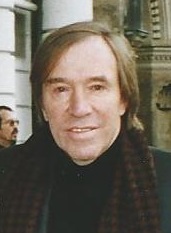Günter Netzer

Netzer in 2005.
|
|||
| Personal information | |||
|---|---|---|---|
| Full name | Günter Theodor Netzer | ||
| Date of birth | 14 September 1944 | ||
| Place of birth | Mönchengladbach, Germany | ||
| Height | 1.78 m (5 ft 10 in) | ||
| Playing position | Attacking Midfielder | ||
| Youth career | |||
| 1952–1963 | 1. FC Mönchengladbach | ||
| Senior career* | |||
| Years | Team | Apps | (Gls) |
| 1963–1973 | Borussia Mönchengladbach | 297 | (108) |
| 1973–1976 | Real Madrid | 85 | (9) |
| 1976–1977 | Grasshopper Club Zürich | 26 | (3) |
| Total | 408 | (120) | |
| National team | |||
| 1965–1975 | West Germany | 37 | (6) |
| Teams managed | |||
| 1977–1985 | Hamburger SV (general manager) | ||
| * Senior club appearances and goals counted for the domestic league only. |
|||
Günter Theodor Netzer (born 14 September 1944 in Mönchengladbach) is a former German football player and team general manager currently working in the media business. As a player, he was considered to be one of the greatest passers in the game's history. As such, he was voted Footballer of the Year in Germany twice, in 1972 and 1973.
Netzer, the son of a greengrocer, played for 1. FC Mönchengladbach from the age of eight until 19 before switching to city rivals Borussia Mönchengladbach in 1963. He scored on his debut against Rot-Weiß Oberhausen, and quickly established himself as a first team regular, helping the club win promotion to the Bundesliga in 1965.
Netzer played for Borussia until 1973. In his 230 Bundesliga games for them, he scored 82 goals. The era also saw one of the most competitive rivalry in Bundesliga's history between Borussia Mönchengladbach and Bayern Munich. Bayern Munich had Franz Beckenbauer, Gerd Müller, Hans-Georg Schwarzenbeck, Paul Breitner and Sepp Maier on their side while Mönchengladbach had Berti Vogts, Herbert Wimmer, Jupp Heynckes and Günter Netzer himself. As they achieved their first successes, the average age of both teams was 21.
With Borussia Mönchengladbach he won the Bundesliga in 1970 and 1971 (the first Bundesliga club to win back-to-back championships), and the DFB-Pokal in 1973. The final was a famous match against 1. FC Köln in which he started as a sub and went onto the pitch during extra time, on his own authority, simply telling the coach "I'll go and play now" whilst removing his tracksuit. He then went on to score the winning goal with only his second contact three minutes later.
...
Wikipedia
